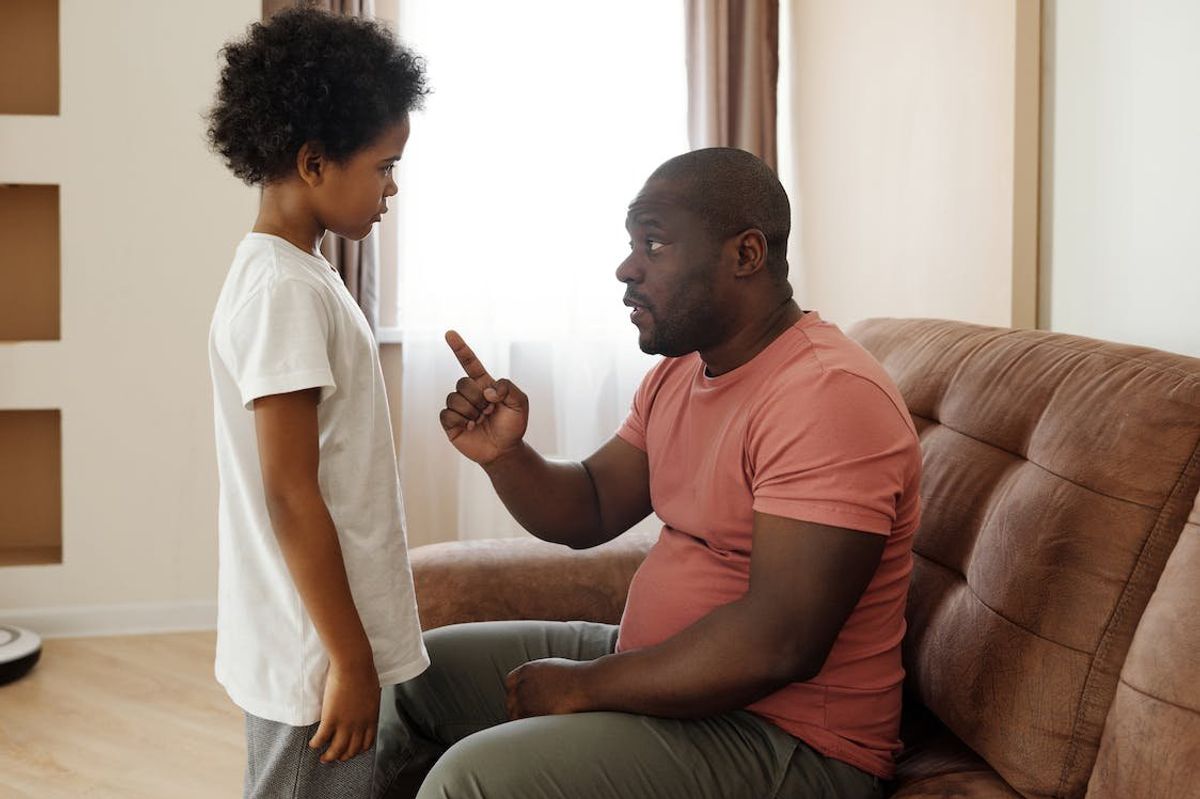This is the parenting style that's best for your child's mental health according to new study
Consistency counts.

A father sternly talking to his son
There’s a long-running debate among parents over the proper way to discipline a child. Some favor the “spare the rod, spoil the child” philosophy. In contrast, others believe being warm and empathetic is the best approach to discipline. So who's right?
A new study from Cambridge University conducted on 7,507 children in Ireland from 9 months to 9 years old looked at which style is better for a child’s mental health.
For the study, researchers compared three parenting styles: “hostile,” in which parents are overbearing, protective, and use physical discipline; “consistent” parenting, where expectations, rules, and discipline are predictable; and “warm” parenting, which emphasizes affection and being empathetic to a child’s needs.
The researchers also looked at two mental health symptom classifications, high-risk and low-risk.
The researchers found that children whose parents used hostile parenting techniques when the child was 3 years old were 1.5 times more likely to have high-risk mental health symptoms and 1.6 times more likely to display low-risk mental health symptoms by the age of 9.
"Our findings suggest that hostile parenting should be avoided as much as possible in early childhood if we want to prevent children from developing increased mental health symptoms," said lead author Dr. Ioannis Katsantonis, a doctoral researcher at the University of Cambridge, said according to Good Morning America. "We found that children in the high-risk class had parents with greater stress and greater likelihood of ongoing physical and mental health problems. These parents might need additional support and resources to address their own needs and enhance their parenting skills."
On the other hand, the study found that consistent parenting could help protect children from developing low-risk mental health symptoms by the age of 9.
"Consistent parenting may help because it provides children with a sense of predictability and security, which can act as a buffer against worsening mental health," said Katsantonis.
The study also found that children raised with warm parenting techniques were neither more nor less likely to develop mental health symptoms by age 9. It appears parental empathy was basically a non-factor in predicting whether a child would have mental health struggles. These findings somewhat contradict previous studies that found empathetic parenting styles may protect children from developing certain emotional and mental health symptoms.
The researchers also stress that parenting isn’t the sole contributing factor to a child’s mental health. Children in low-income households or those who are raised by single parents are more likely to have mental health issues. Female children are also more likely than males to develop mental health symptoms by the age of 9. Genetics also plays a big role in whether a child will develop mental health symptoms.
The big takeaway from the study is the importance of consistency when raising children. It appears that when children can predict an adult’s behavior and understand what is expected of them, it is better for their mental health.
Sanford Health offers some helpful tips for parents who want to practice more consistency in their expectations, responses and routines so their children can benefit from that parenting style.
- A doctor specializing in child development shares 5 of her most surprising parenting tips ›
- Developmental scientist shared her 'anti-parenting advice' and parents are relieved ›
- The best parenting advice I've read in a long time: Someone will always criticize you. ›
- Therapists shares how to diffuse a toddler meltdown - Upworthy ›
- 10 things kids get in trouble for that adults get away with - Upworthy ›
- Mom refuses to let kid go to "drop-off" birthday party - Upworthy ›
- Comedian Jimmy Carr explains why young men struggle - Upworthy ›





 In a 4-day model, kids often (but not always) receive less instructional time. Photo by
In a 4-day model, kids often (but not always) receive less instructional time. Photo by 
 Flags can be a symbol of both patriotism and nationalism.
Flags can be a symbol of both patriotism and nationalism. Love of one's country is nice. But there's a difference between patriotism and nationalism.
Love of one's country is nice. But there's a difference between patriotism and nationalism.  Mark Twain had quite a bit to say about patriotism.
Mark Twain had quite a bit to say about patriotism. 
 Retro vibes with bold colors and music! 🎶✨ #80sFashion
Retro vibes with bold colors and music! 🎶✨ #80sFashion Confused expression with a questioning gesture.
Confused expression with a questioning gesture. Students eagerly participate in a classroom discussion.
Students eagerly participate in a classroom discussion.